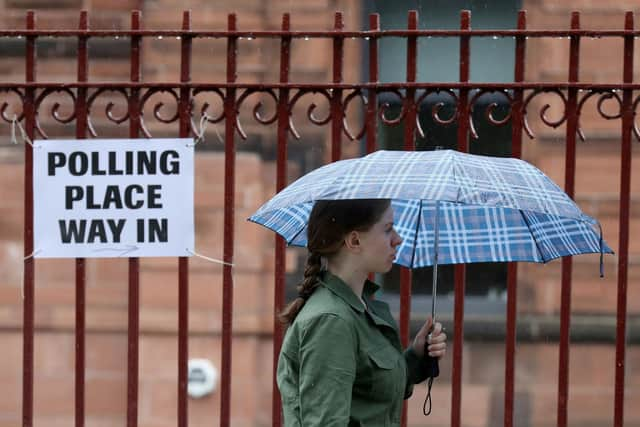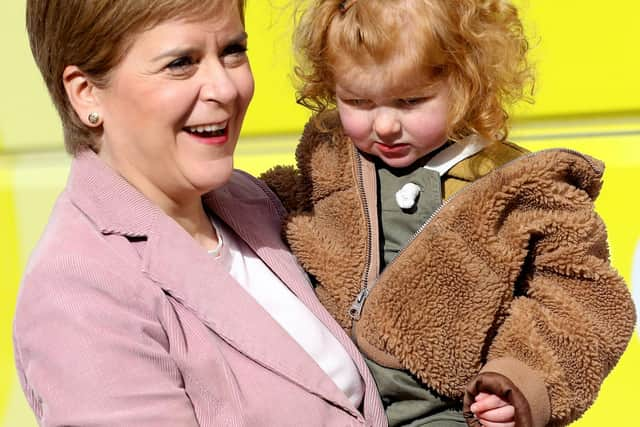Main Scottish parties making election promises they simply can’t deliver - Euan McColm
Next Saturday, two days after Scots go to the polls, we’ll learn who has won (or, more accurately, we will learn the margin of the SNP’s victory) and then the next Scottish Government can set about failing to deliver its promises.
The highly respected - until it starts dealing in uncomfortable truths - think tank, the Institute for Fiscal Studies has examined the manifesto spending pledges of the three largest Scottish political parties and concluded that they are united by a lack of credibility. The SNP, Labour, and the Scottish Conservatives have failed to level with voters about the scale of the economic challenge ahead, says the organisation.
Advertisement
Hide AdAdvertisement
Hide AdAll of these parties are united in presenting a vision of Scotland that is more compassionate, more focused on the needs of the vulnerable.


David Phillips, an associate director at the IFS, points out that there is a rare example of consensus among the three main parties, each aiming for an expanded welfare state with measures including doubling the Scottish child payment, universal free school meals for primary-school children, increases in carer’s allowance, and expansions of free childcare.
But, while this sort of thing may flatter the egos of Scots voters, it does nothing but set us up for disappointment.
All of the manifestos are detached from the reality of Scotland’s financial situation and for demands the next Scottish Government will face. Rising demand - and, therefore, costs - for health and social care and predicted to chew through as much as three quarters of the projected increases in the Scottish Government’s budget in the coming years.
First Minister Nicola Sturgeon unsurprisingly, rejects the IFS’s analysis. It may be, in her words, a “respected organisation” but she is confident in the commitments her party has put forward in its manifesto.


She was hardly likely to say otherwise.
On publication of the IFS analysis, Sturgeon said she would not “quibble” with the organisation. And then she went on to do much more than that.
In fact, the First Minister’s response was to - try to - tear apart the think tank’s analysis. The commitment she has made would require neither cuts nor tax rises. In fact, her government was being both cautious and prudent.
Faced with difficult questions, the First Minister reaches for a tried and tested response. The thing is, you see, that Scotland’s fiscal position is a reflection of our position in the UK, not of the decisions an independent Scotland would take.
Advertisement
Hide AdAdvertisement
Hide AdThis is paper-thin stuff, suggesting that independence would immediately change Scotland’s financial position rather - as Sturgeon’s Fiscal Commission has already pointed out - make it weaker in the first instance.
It is not just on the matter of manifesto pledges that Sturgeon stands to disappoint voters. When it comes to her central mission of achieving independence, she is on course to disappoint her supporters.
Since defeat in the 2014 referendum and her elevation to the top job in Scottish Government, Sturgeon has repeatedly promised impatient nationalists that independence is within touching distance, that the Yes movement is firmly in “one more heave” territory.
But the reality is that that every time the First Minister has marched her troops up the hill, she has marched them down again.
The current version of events is that Sturgeon plans to have a referendum in the second half of the next parliament as part of the coronavirus recovery process. Because what any country needs when it’s trying to rebuild its economy after a pandemic is for its leaders to focus their attention on a divisive constitutional battle, right?
However, if Sturgeon truly did believe a referendum was on the horizon, surely she and her ministerial team would have done at least some of the groundwork? Surely there would be a new economic case to put in front of voters?
In fact, there has been no new analysis of how Scotland would survive and thrive outside the Union beyond the old “other countries flourish” line. But, while it is, indeed, true that other independent countries get along perfectly well, there are questions to be answered about how Scotland would get to that place. What currency would we use? How would we divvy up debt and assets with the rest of the UK? What sort of spending would be possible in the early years of an independent Scotland? How would that spending be funded? Through cuts? Through borrowing? Through tax rises? Through all of these?
Sturgeon’s defence of her failure to draw up a new independence plan is that she has been focused on the coronavirus pandemic. In fact. she insists, she has put plans for a referendum on hold while her efforts are concentrated on getting the country through current crisis.
Advertisement
Hide AdAdvertisement
Hide AdThis is absolute nonsense. The First Minister tells us she has put the referendum issue to one side while repeatedly talking about the need for Scotland to have another referendum. She insists plans for a referendum are on hold while her government publishes its plan to hold a referendum.
Of course, the stubborn fact remains that Sturgeon doesn’t have the authority to set up another referendum. If there is to be an Indyref2, it will require the blessing of the UK government and nobody in the Scottish cabinet seriously believes that Prime Minister Boris Johnson is about to give the green light to another vote on the constitution.
But facts don’t seem to matter in this election campaign where all of the main parties promise things they cannot deliver. That’s a no risk strategy for those that won’t win but soon Nicola Sturgeon is going to have to answer to supporters who believe her when she tells them a referendum is coming soon. The truth is that the First Minister simply cannot deliver on her biggest promise of all.
Comments
Want to join the conversation? Please or to comment on this article.